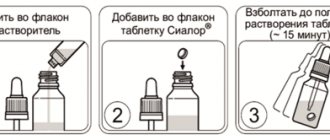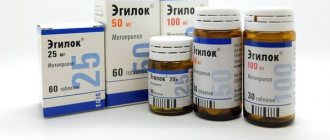Has restrictions during pregnancy
Has restrictions when breastfeeding
Prohibited for children
Has restrictions for older people
Has limitations for liver problems
Has limitations for kidney problems
Relief suppositories are indicated for the treatment of internal forms of hemorrhoids. There are several types of Relief suppositories, differing from each other, but all of them are designed to improve the condition of the final part of the digestive tract (the mucous membrane of the rectum), relieve constipation, and are also used to prevent various diseases. Suppositories can be combined with liniments, using them in one therapeutic complex.
Compound
| Rectal suppositories | 1 sup. |
| active substance: | |
| phenylephrine hydrochloride | 5 mg |
| excipients: shark liver oil - 60 mg; cocoa bean butter - 1710 mg; corn starch - 224.2 mg; methyl parahydroxybenzoate - 0.4 mg; propyl parahydroxybenzoate - 0.4 mg |
| Ointment for rectal and external use | 100 g |
| active substance: | |
| phenylephrine hydrochloride | 0.25 g |
| excipients: shark liver oil - 3 g; mineral oil - 14 g; Vaseline - 71.9 g; methyl parahydroxybenzoate - 0.2 g; propyl parahydroxybenzoate - 0.1 g; anhydrous lanolin - 3 g; benzoic acid - 0.1 g; corn oil - 0.05 g; glycerol - 1 g; lanolin alcohol - 0.75 g; paraffin - 2 g; purified water - 1 g; thyme oil - 0.08 g; vitamin E (alpha tocopherol) - 0.05 g; white beeswax - 2.52 g |
Types of the drug
Pharmacies provide the patient with a wide range of Relief rectal suppositories, which are sold without a prescription, but not all may be suitable. Before starting treatment for any type of hemorrhoids, you should consult your doctor. What Relief candles are, and how they differ, is described in detail below.
Relief
Suppositories are intended mainly for the treatment of pathologies of blood vessels - internal hemorrhoids. The natural ingredients included in the product reduce local bleeding and swelling. Cocoa butter softens the mucous tissues of the intestines. Inflammatory processes are reduced and the condition is normalized. They are used in preventive procedures for all types of hemorrhoids to stop bleeding.
Relief Advance
Used to treat blood vessels with severe pain or obvious burning. The anesthetic benzocaine contained in the drug helps reduce burning and pain in the anorectal area when symptoms of pathology intensify, after colorectal surgery, and diagnostic procedures.
Efficiency of the drug
Cocoa butter produces a pronounced softening effect. The differences between Relief and Relief Advance are that the latter is prescribed for severe attacks of pain that accompany the acute stage of hemorrhoids. It is used in severe forms of pathology, after surgery to stimulate the restoration of intestinal mucous membranes, in the treatment of anal fissures.
Relief Ultra
It mainly helps to reduce irritation and itching with increased painful symptoms. Hydrocortisone acetate and zinc sulfate relieve itching and reduce inflammation. Prescribed as an additional remedy to relieve inflammation. Thanks to the corticosteroid, suppositories quickly cope with swelling and pain syndromes, accompanied by constant itching and irritating burning.
Indications for the use of various forms of Relief
The suppositories have a good drying effect, tightening the wounds of the intestine and the lower extremity of the anal canal. Recommended for various types of hemorrhoids, inflammation, skin rashes, anal fissures.
Relief Pro
Suppositories are intended mainly for the treatment of pathology of the blood vessels of the terminal part of the digestive tract, accompanied by painful sensations and inflammatory processes. Due to anesthetic, anti-inflammatory and anti-edematous effects.
The therapeutic effect is achieved due to the prolonged action of lidocaine and glucocorticoid - fluocortolone pivalate. The latter is an anti-inflammatory and anti-allergic substance that blocks histamine receptors, thereby preventing the development of allergic reactions.
The anesthetic lidocaine blocks epithelial sodium channels, thereby stabilizing the neuronal membrane. The action reduces its permeability and ability to transmit pain signals.
Algorithm for choosing a medication
The presence of several varieties of the antihemorrhoidal drug Relief allows you to select the drug individually for each patient, therefore, which one to choose depends on the symptoms of the pathology. Rational use of suppositories will delay or prevent colorectal surgery.
Relief drug selection algorithm
Thanks to various combinations of ingredients, a targeted approach can be taken to selecting an acceptable product. Depending on the signs of pathology, the following types of Relief are used:
- Bleeding – Relief.
- Acute pain attacks - Relief Advance.
- Inflammatory reactions, itching, swelling - Relief Ultra.
- Accumulation of inflammatory and tumor infiltrate, exudation – Relief Pro.
The last three antihemorrhoidal medications are used in the preoperative and early postoperative period for anesthesia and wound healing.
Which type is more effective?
The drug has various indications for use, which are indicated in the instructions for use. But consulting a doctor will help you decide which is best. Most often, doctors opt for Advance suppositories, which contain a high concentration of the local anesthetic benzocaine.
The drug is good at reducing pain attacks in acute forms of pathology and after surgery. Used when performing diagnostic procedures. The Ultra form gives a quick positive effect on acute itching and burning. Zinc and glucocorticoid inhibit inflammation and reduce the sensation of itching.
If there is no positive effect or the disease worsens, you should immediately seek advice from a specialist.
What to replace the drug with?
Analogues of Relief are considered to be all drugs that are similar in composition or action. The patient can use the following medications:
- Hemorrhoids – 1 suppository contains benzocaine and extracts of medicinal plants (chamomile, belladonna, chestnut, etc.). Hemorrhoids and anal fissures are indications for use.
- Anuzol - active ingredients - xeroform, zinc sulfate and belladonna extract. , Ukraine.
- Doxyproct – comes in the form of an ointment (for the treatment of external hemorrhoids) and suppositories (for internal ones). Active ingredients: calcium dobesilate, lidocaine hydrochloride.
The use of drugs with similar effects is recommended only after visiting a doctor's office.
Painkillers:
Does the drug Analgin help with headaches?
Directions for use and doses
Rectal suppositories
Rectally, after hygiene procedures. 1 sup. in the morning, at night and after each bowel movement, up to 4 times a day.
Ointment for rectal and external use
Externally, rectally, after hygiene procedures. Remove the protective cap from the applicator, attach the applicator to the tube and squeeze out a small amount of ointment to lubricate the applicator.
Adults and children over 12 years of age - up to 4 times a day in the morning, evening and after each bowel movement. Apply the ointment carefully through the applicator to the affected areas outside or inside the anus, as well as to the skin in the anus.
After each use, rinse the applicator thoroughly and place it in the protective cap.
The difference between Relief® drugs
Let's take a closer look at how the candles in the Relief line differ from each other. The following rectal suppositories of this line are produced:
- Relief, the active ingredient of which is phenylephrine, which has a vasoconstrictor effect, which reduces swelling, itching and bleeding.
- Relief Advance is a local anesthetic used to treat local pain syndrome.
- Relief Ultra, the active ingredient in which is hydrocortisone acetate, an anti-inflammatory component used to treat itching and eczema of the anorectal area, and zinc sulfate, which is used to accelerate healing.
Now let's figure out what Relief ointments are. The manufacturer produces two types of the drug in this dosage form. The difference between them, as with rectal suppositories, lies in the composition and therapeutic effect.
There are such types of Relief ointments on sale as Relief ointment with phenylephrine, which has an anti-edematous and hemostatic effect. And also Relief Advance ointment, with benzocaine, which has an analgesic effect. Each of them has its own area of application.
Manufacturer
Rectal suppositories
Instituto De Angeli S.r.L. 50066 Regello (Florence), Loc. Prulli, 103/C, Italy.
Owner of the registration certificate: JSC Bayer. Russia.
Ointment for rectal and external use
Sagmel, Inc., Chicago, USA.
1580 South Milwaukee Ave., 415 Libertyville, IL 60048.
Additional information can be obtained at: 107113, Moscow, 3rd Rybinskaya st., 18, building 2.
Tel.; Fax.
Indications and contraindications
Direct indications for treatment with a therapeutic agent are pathologies of the rectum of a non-infectious nature, namely:
- external, internal types of hemorrhoids;
- chronic and acute fissures of the anus;
- mechanical injuries, erosive proctitis;
- ulcer or fistula.
Types of hemorrhoids
Stops prolonged itching of various types in the anal area.
The main contraindication is individual intolerance to the ingredients of the drug. It is also prohibited to use candles for:
- high blood pressure;
- paroxysmal tachysystolic disturbances of heart muscle contractions;
- congestive heart failure;
- intracardiac blockades;
- acute functional renal and hepatic impairment;
- thyroid disease – hyperthyroidism;
- inflammation of the pancreas;
simultaneous use with monoamine oxidase inhibitors - Phenelzine, Befol, Moclobemide;- diabetes mellitus;
- venous thromboembolic disease;
- tuberculosis;
- granulocytopenia.
The medication should not be used under 12 years of age. During periods of breastfeeding and pregnancy, it is recommended to consult a gynecologist.
special instructions
If bleeding is observed while using the medicine, the course of treatment should be completed immediately. It is also worth refusing further use if the condition worsens, or if there is no visible result after 5-7 days from the start of using the product.
The drug can be stored for 24 months. It should be kept in a dry and dark place at room temperature away from children.
You should not use Relief in parallel with antihypertensive drugs and antidepressants.
The medicine does not affect the ability to drive vehicles and other mechanisms that require increased concentration.
General information about the drug
Relief suppositories are used to treat internal forms of hemorrhoids. The line includes several varieties of suppositories, which differ in composition and other parameters. However, they all directly affect the underlying disease and quickly relieve its main symptoms. The drug is produced by a German company.
The drug Relief belongs to the category of antihemorrhoids and has an anti-inflammatory, hemostatic, and immunomodulatory effect. The product of natural origin is actively used in proctology. It fights well against the main manifestations of hemorrhoids, which are visible even to the naked eye.
Candles are torpedo-shaped and come in light yellow or white. Packaged in aluminum blisters of 6 units. There are usually two such blisters in a cardboard pack.
Indications for the use of suppositories are:
- hemorrhoids of external/internal localization;
- itching in the anus;
- erosions and ulcers of the anus;
- tear of the anal ring;
- bleeding from hemorrhoids;
- inflammation of the rectal canal mucosa;
- acceleration of recovery in the postoperative period.
The active ingredient is phenylephrine hydrochloride. This substance acts as an adrenergic stimulant. It has a local vasoconstrictor effect, ensures normalization of blood circulation in hemorrhoids, and reduces swelling. The candles also contain: shark oil, methyl ether, cocoa butter, corn starch.
Relief rectal ointment 2.5 mg/g 28.4 g No. 1
Name
Relief.
Description
Yellow ointment without foreign substances with a weak characteristic odor.
Main active ingredient
Shark liver oil + phenylephrine.
Release form
Rectal ointment.
Pharmacological properties
Phenylephrine hydrochloride is an alpha-adrenomimetic, has a local vasoconstrictor effect, which helps reduce exudation, tissue swelling, and itching in the anorectal area.
Indications for use
As a symptomatic remedy for hemorrhoids, anal fissures, anal itching.
Directions for use and doses
Use the drug after hygiene procedures. Remove the protective cap from the applicator. Attach the applicator to the tube and squeeze out a small amount of ointment to lubricate the applicator. Apply the ointment carefully through the applicator to the affected areas outside or inside the anus up to 4 times a day (in the morning, at night and after each bowel movement). After each use, rinse the applicator thoroughly and place it in the protective cap. Children under 12 years old - as prescribed by a doctor. The dose used for self-treatment of hemorrhoids in adults and children over 12 years of age should not exceed 2 mg of phenylephrine hydrochloride (1 g of ointment contains 2.5 mg of phenylephrine hydrochloride) per day. It is not recommended to exceed the indicated dose without a doctor's prescription.
Use during pregnancy and lactation
The drug is not recommended for use during pregnancy and lactation.
Impact on the ability to drive vehicles and operate machinery
It is recommended to exercise caution due to the possible development of adverse reactions from the nervous system.
Precautionary measures
For patients with arterial hypertension, cardiovascular diseases, thyroid diseases, angle-closure glaucoma, diabetes mellitus, liver diseases, pancreas diseases, urinary disorders (for example, in the case of prostatic hyperplasia), the drug can be used only after consulting a doctor; during treatment it is necessary doctor's supervision. Before prescribing the drug, the doctor should clarify the allergic history, including allergic reactions to other sympathomimetic drugs. In case of heavy bleeding from the anus or lack of therapeutic effect when using the drug, you should consult a doctor.
Interaction with other drugs
The drug should not be used simultaneously with other vasoconstrictors (regardless of the route of administration), as well as with antihypertensive drugs (13-blockers). Atropine sulfate blocks reflex bradycardia caused by phenylephrine and increases the pressor response to phenylephrine. The simultaneous use of phenylephrine with B-blockers can lead to arterial hypertension and severe bradycardia with possible heart block. Caution should be exercised when using the drug Relief together with thyroid hormones and drugs that affect cardiac conduction (cardiac glycosides, antiarrhythmic drugs). When used simultaneously with drugs that cause potassium excretion (for example, with diuretics such as furosemide), hypokalemia may increase and sensitivity to vasopressor drugs such as phenylephrine may decrease. The simultaneous use of phenylephrine and other sympathomimetic drugs can lead to additional stimulation of the central nervous system, which is accompanied by agitation, irritability, insomnia, and the possible development of a convulsive attack. Relief should not be used simultaneously or within 14 days after stopping treatment with MAO inhibitors.
Contraindications
Hypersensitivity to the components of the drug, severe arterial hypertension, tachysystolic heart rhythm disturbances, decompensated heart failure, cardiac conduction disorders, severe renal and/or liver failure, thyrotoxicosis, acute pancreatitis, thromboembolism (including previous ones), granulocytopenia, simultaneous use with monoamine oxidase inhibitors (MAOIs) or within 14 days after stopping treatment with MAO inhibitors.
Compound
Active ingredient: phenylephrine hydrochloride 2.5 mg/g. Excipients: mineral oil, petrolatum, methyl parahydroxybenzoate (E218), propyl parahydroxybenzoate (E216), anhydrous lanolin, benzoic acid (E210), corn oil, glycerol, lanolin alcohols, paraffin paraffin (58/60), thyme oil, vitamin E, white wax, purified water.
Overdose
If the recommended single and daily doses are significantly exceeded, a tendency to hypercoagulation may occur. In case of overdose, the following disorders are possible: arterial hypertension, pain and discomfort in the heart, palpitations, respiratory disorders, non-cardiogenic pulmonary edema, agitation, convulsions, sleep disturbances, anxiety, irritability, psychosis with hallucinations, general weakness, anorexia, nausea, vomiting, oliguria, urinary disorders, facial flushing, feeling of coldness in the extremities, paresthesia, hyperglycemia, hypokalemia, decreased blood flow to vital organs, which can lead to deterioration of blood supply to the kidneys, metabolic acidosis, increased workload on the heart due to increased total peripheral resistance. Treatment is symptomatic.
Side effect
The following adverse reactions are possible: From the cardiovascular system: reflex bradycardia, heart rhythm disturbances, increased blood pressure. On the part of the immune system: hypersensitivity reactions, including cross-type reactions in the case of allergic reactions to other sympathomimetic agents, which can manifest as skin rash, itching, angioedema, contact dermatitis. From the nervous system: dizziness, nervousness, headache, tremor, insomnia, anxiety, feeling of hot flashes. From the skin and subcutaneous tissues: contact dermatitis, hyperemia, skin rash, itching, swelling, pain, burning. Reporting Adverse Reactions If you experience any adverse reactions, consult your physician. This recommendation applies to any possible adverse reactions, including those not listed in the package insert. You can also report adverse reactions to the Adverse Drug Events Information Database, including reports of drug failure. By reporting side effects, you can help provide more information about the safety of the drug.
Storage conditions
At a temperature not exceeding 25 °C, out of the reach of children.
Buy Relief rectal ointment 2.5 mg/g 28.4 g No. 1 in the pharmacy
Price for Relief rectal ointment 2.5 mg/g 28.4 g No. 1
Instructions for use for Relief rectal ointment 2.5 mg/g 28.4 g No. 1
Use during pregnancy and breastfeeding
Many women experience hemorrhoids during pregnancy. Itching, discomfort in the anus and even pain - these symptoms are mainly accompanied by the disease. To relieve its symptoms, it is better to resort to natural remedies.
Relief Advance rectal suppositories can be used during pregnancy and breastfeeding, after childbirth.
Before prescribing, the doctor must assess all the risks for the woman and the fetus. Reliable clinical trials of the effects of the drugs have not been conducted. Relief Advance is recommended for therapeutic purposes starting from the second trimester. In the early stages of gestation, active substances can provoke uterine contractility, causing spontaneous abortion.
If this medication is not suitable, a woman experiences an allergic reaction, it should be replaced with an analogue. It is better to choose products marked “sensitive”. They have a mild effect on the mucous membrane and do not cause irritation. Relief Pro and Ultra contain a hormonal supplement and are therefore prohibited during gestation and lactation. There are known cases of children being born with cleft palate and eye problems after women used suppositories.
Suppositories of the Relief family
Rectal suppositories of the Relief line are represented on the domestic market by four drugs. They differ in composition and therapeutic purpose. The choice of a specific medicine is determined by the symptoms of the disease. Each case of hemorrhoids requires an individual approach. Relief line suppositories should be used only as prescribed by a proctologist. In this case, the doctor will necessarily take into account the characteristics of the course of the disease and its leading symptom.
Classic Relief
Suppositories are prescribed for the treatment of pathologies of blood vessels or internal hemorrhoids. The natural components present in the composition stop bleeding and swelling. Cocoa butter softens the intestinal mucosa. Suppositories can be used for preventive purposes, for constipation. This is a classic drug that is suitable for almost all categories of patients.
The medicine can be used for a long time. Contraindications include thyrotoxicosis, glaucoma, old age and granulocytopenia.
Not recommended for treatment of children under 12 years of age.
Negative reactions are rare. Usually caused by an overdose or individual intolerance to the incoming components. In the initial stages of hemorrhoids, it is permissible to use it in courses with venotonic tablets.
Relief Advance
The drug is used for severe pain or burning. It has a stronger analgesic effect. The drug is used for acute hemorrhoids, strangulated node or in the postoperative period. It reduces the number of granulocytes. Therefore, constant monitoring of the leukocyte count is required during treatment.
Suppositories are prescribed with caution to young patients, during pregnancy and breastfeeding. If acute thrombosis is suspected, it is better to refuse them. Relief Advance is not recommended for use if the skin is damaged. This may provoke systemic absorption. In addition, if there is heavy bleeding from the rectum or if unpleasant symptoms persist within 7 days after starting the course of therapy, you should consult your doctor again.
Relief Ultra
Zinc sulfate and hydrocortisone acetate relieve itching and reduce the severity of inflammation. Candles have a drying effect. Recommended for various types of hemorrhoids, anal fissures and diseases of the anorectal area (dermatitis, eczema, erosion). Doctors prescribe it if paraproctitis is suspected, or if the temperature rises in the postoperative period to prevent inflammation.
Only short courses of use are allowed (no more than 7 days). After treatment you should take a break. If it is impossible to refuse the medication, it is replaced with ordinary Relief suppositories. The drug is strictly contraindicated in patients with diabetes mellitus, fungal and bacterial infections (tuberculosis, syphilis), neoplasms, or a history of allergic reactions. Not recommended for people with high blood pressure.
Relief Pro
Suppositories are used to treat chronic pathologies of intestinal blood vessels, which are accompanied by pain and inflammation. They have an anti-edematous and anesthetic effect. The composition contains fluocortolone pivalate, a substance that blocks the production of inflammatory mediators.
The drug has a wide range of applications. It is prescribed for erosive proctitis, anal fissures, fistulas. Relief is also used for pain relief after surgery. Suppositories quickly help relieve swelling.
Relief Pro has many side effects. Patients often experience intracardiac blockades, increased blood pressure, and inflammation of the pancreas. The possibility of increased excitability and irritability and tremor of the fingers cannot be ruled out. In some cases, people complain of an inexplicable feeling of fear.
Popular questions about Relief
What relief from what?
Simple relief has a vasoconstrictor effect. Used to reduce swelling, itching and stop bleeding. Relief Pro eliminates inflammation and swelling. Advance helps reduce pain. Ultra relieves inflammation, reduces itching, burning and has an antiseptic effect.
Broncholitin for what?
Depending on the type of remedy, it helps eliminate the following symptoms of hemorrhoids: burning, swelling, itching, pain, inflammation, stop bleeding.
How long can you take Relief ointment?
The standard course of treatment is from 7 to 14 days.
What is the difference between Relief ointment and suppositories?
Suppositories are used for internal hemorrhoids, and ointment for external and internal hemorrhoids.
Popular analogues
It happens that suppositories from the Relief line are not suitable for the patient. In this case, the doctor prescribes an analogue. It must be a drug with a similar therapeutic effect or composition. However, the release form may differ. Some patients opt for all-natural remedies or Ayurvedic preparations.
One of the popular analogues is Proctosan. Used for the treatment of dental fissures. Patients usually tolerate Proctosan well. In isolated cases, allergic reactions in the form of swelling and redness are observed. Among other analogues of Relief candles, it is necessary to highlight:
- Heparin ointment
. This is the cheapest treatment option for hemorrhoids. It is used for local treatment of affected areas every time pain occurs. - Gepatrombin G
. It has an anti-inflammatory and wound-healing effect, promotes the resorption of hemorrhoidal blood clots and prevents the formation of the latter. - Procto-Glyvenol
. Available in the form of suppositories and ointments. The latter has a venotonic effect and helps well in the treatment of hemorrhoids.
Proctosedyl is a hormonal analogue of Relief. It is an emergency aid for exacerbation of hemorrhoids. Can be used as ointment or suppositories.
Pharmacological properties of the drug Relief
Phenylephrine hydrochloride is an adrenergic agonist, the use of which leads to a local vasoconstrictor effect. This normalizes the relationship between blood flow to hemorrhoids and blood outflow from them, and also causes a decrease in exudation, swelling, itching, serous discharge in hemorrhoids and other diseases of the anorectal area. Shark liver oil has local anti-inflammatory, hemostatic, wound healing and immunomodulatory effects. Suppository base: cocoa butter; ointments: mineral oil, corn oil, thyme oil, glycerin and vitamin E - a safe base, has a softening effect.
Relief, Advance and Ultra: comparison
Comparing the two drugs Relief and Relief Advance, one can note their different components. The production of the former uses phenylephrine, and the latter - various analgesics.
Therefore, Relief Advance has a stronger analgesic effect, but in terms of the number of adverse reactions it is ahead of other medications in the line.
Among them, it is necessary to highlight drowsiness, dizziness, hypersensitivity (skin itching, redness, swelling), shortness of breath and rapid heartbeat. The classic medicine Relief can be combined with other medications. Advance is not recommended to be taken simultaneously with antihypertensive drugs and antidepressants. In some cases there may be other restrictions.
If we compare Relief and its Ultra form, then in the second case there are several times more indications for use. This drug is justified in the treatment of external and internal hemorrhoids, erosive ulcerations on the mucous membrane, proctitis and paraproctitis, and ulcers of a nonspecific nature. In addition, it is advisable to use the medication in case of fistulas and anal itching caused by dermatitis or eczema. Due to the corticosteroid it contains, Relief Ultra has many contraindications. For people with restrictions on the use of hormones, it is better to choose regular Relief.





